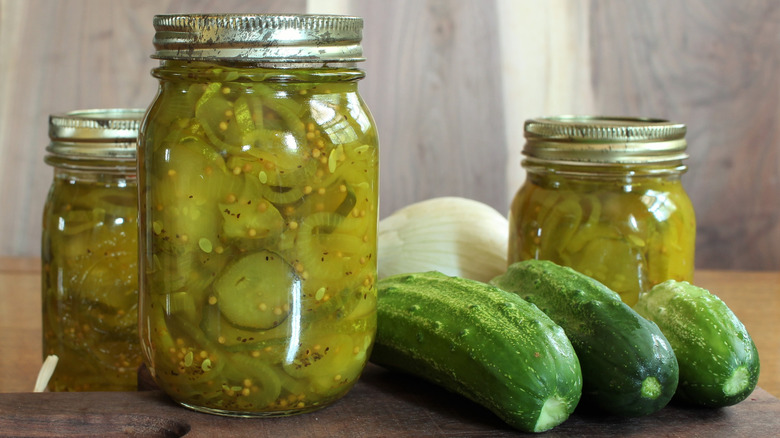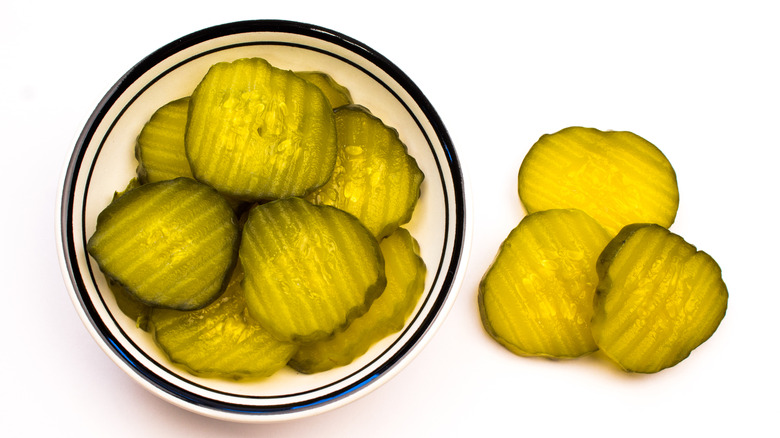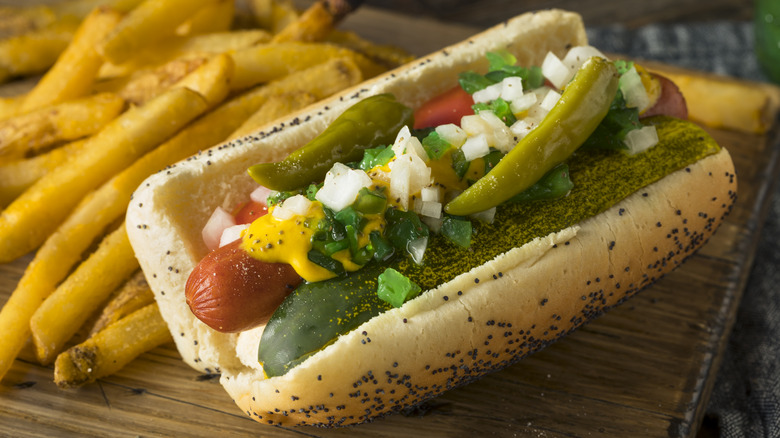What Sets Bread And Butter Pickles Apart From Other Pickles?
Since 2400 B.C., pickles have amassed a global cult following for their unusual taste, snacking capabilities, and versatile nature. Full sour, half sour, dill, cinnamon, bread and butter, Kool-Aid — you name it, there's a pickle for it. But whether you can chow down on an entire spear or immediately pick them off your burger, pickles are an absolute favorite for diners and snackers everywhere. So much so that nearly 20 billion pickles are consumed by Americans every year, according to Zippia.
In the Netherlands, the word "pekel" means brine, or heavily salted water used when pickling, per CNN. When paired with spices such as garlic, mustard seed, and peppercorn, this vinegar-heavy base gives dill pickles their naturally sharp (and somewhat pungent) flavor. But besides its unique taste, perhaps one of the most popular characteristics of the pickle is its extended shelf life. According to Kitchn, pickles can be consumed up to two years after being opened.
However, dill pickles are starting to outgrow their glass jars. Shoppers can now find them lingering throughout the grocery store in unsuspecting products including candy, soft drinks, beer, and even makeup. But what about the others, such as bread and butter pickles? What makes them different, and why aren't they seen in a lot of snacks?
Dill vs. bread and butter pickles
The key difference between these two types of pickles is their taste. Despite bread and butter pickles using the same cooking method as dill pickles, they use far different spices that make them sweeter. According to Wyse Guide, sugar is added to the bread and butter brine to help alleviate its sharp vinegary taste. Mustard seed, celery seed, clove, turmeric, and other spices are included to give the sliced pickles their full flavor.
Although this sweetened profile may help bridge the gap between pickle lovers and pickle haters, it may discourage the production of flavored snacks. Unlike sweet pickles, The Conversation reports that dill pickles consistently offer a malleable taste that can be infused with many of our favorite salty snacks. By adding the dill pickle's sour and savory flavoring, the snack transforms into the perfect tangy treat.
On the other hand, bread and butter pickles are a stand-alone snack. They have been this way since they were first patented in 1923 by cucumber farmers Omar and Cora Fanning, who would trade their sweetened pickles for bread and butter, per Saveur. These pickles were often made from smaller leftover cucumbers and were renowned for their sweet and salty complexion. But while these two flavor profiles may seem complimentary, the sugary nature of these pickles can make them taste almost sickly sweet. Fortunately, this candied presence is desired by many other complex foods that extend past salted snacks.
Sweet pickles are a tradition in the Windy City
One of the best foods to incorporate sweet pickles into is chicken and tuna salad. When combined, the sugary elements from the chopped pickles round out the earthy and fatty undertones of celery and mayo. And when paired with tart, dried cranberries, this sweetness elevates the combined taste of an otherwise creamy yet bitter meal.
This same logic can be applied to barbecued or smoked foods. Because these meats tend to already contain overly strong flavors and sugary sauces, it's best to pair them with similar-tasting pickles. Although dill pickles are still a favorite, they can often compete and overpower the smoky notes in the meal. After all, wouldn't you want a topping to elevate your food rather than mask it? That said, bread and butter pickles work best with pulled pork and other pre-sweetened smoked meats.
But perhaps the most common food that pairs well with relish or chopped pickles is a good ol' classic hot dog. In fact, this bright green relish is one of the signature traits of a traditional Chicago-style dog, along with a mound of yellow mustard, hot peppers, and a sesame seed bun. Both sweet and dill relish are popular options within the Windy City, but because a dill pickle spear also tops the hot dog, chopped sweet pickles are the desired choice. Luckily, this same method is not applied to a classic Chicago-style pizza, though we're sure there's a pickle pizza out there somewhere.


